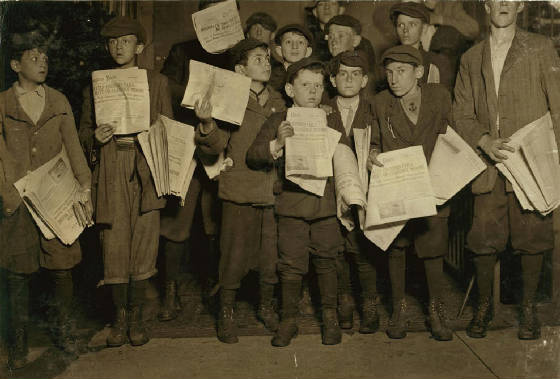

Lewis Hine caption: After midnight April 17, 1912, and still selling extras. There were many of these groups of young news-boys selling very late these nights. Youngest boy in the group is Israel Spril (9 yrs. old), 314 I St., N.W., Washington D.C. Harry Shapiro, (11 yrs. old), 95 L St., N.W., Washington, D.C. Eugene Butler, 310 (rear) 13th St., N.W. The rest were a little older. 12th St. near G [or C?] Sundays. Location: Washington (D.C.), District of Columbia.
“They did anything they could to make money. It was a very poor family, with lots of children. Their parents were from Russia. My father lost his mother at a young age.” -Patricia Coshland, daughter of Israel April
“Night after night hundreds of boys and men hung around the newspaper offices, fought their way to the distributing counters and out into the street. For three consecutive nights, this week, I found them wandering about…hanging onto the job until one or two in the morning, simply to make a record sale, perhaps, or to unload the heavy bunch of papers in which they had unwisely invested.” -Lewis Hine, Child Labor at the National Capital, 1912, National Child Labor Committee publication 264, Library of Congress
**************************
In 1881, anti-Jewish riots, called “pogroms,” swept through Russia. Thousands of Jewish homes were destroyed, families were driven into poverty, and many people were seriously injured. The pogroms continued for more than three years, and led many Jews to emigrate from their homeland. Most fled to the United States.
According to the 1900 census, Mitchell April, a Jew born in Russia in 1871, was working as a farm laborer in Millville, New Jersey. He had arrived in the US in 1882, with his parents, Reuben and Elizabeth April, who were farmers. Mitchell had married Mollie (maiden name not determined) in 1891. She was also from Russia. They had three children, Annie, Ethel and David. In 1908, the family, including Mitchell’s parents, moved to Washington, DC, where, according to the 1910 census, Mitchell ran a grocery store, and 17-year-old daughter Ethel worked in a dry goods store. They had three more children, sons Samuel, Israel and Ellis.
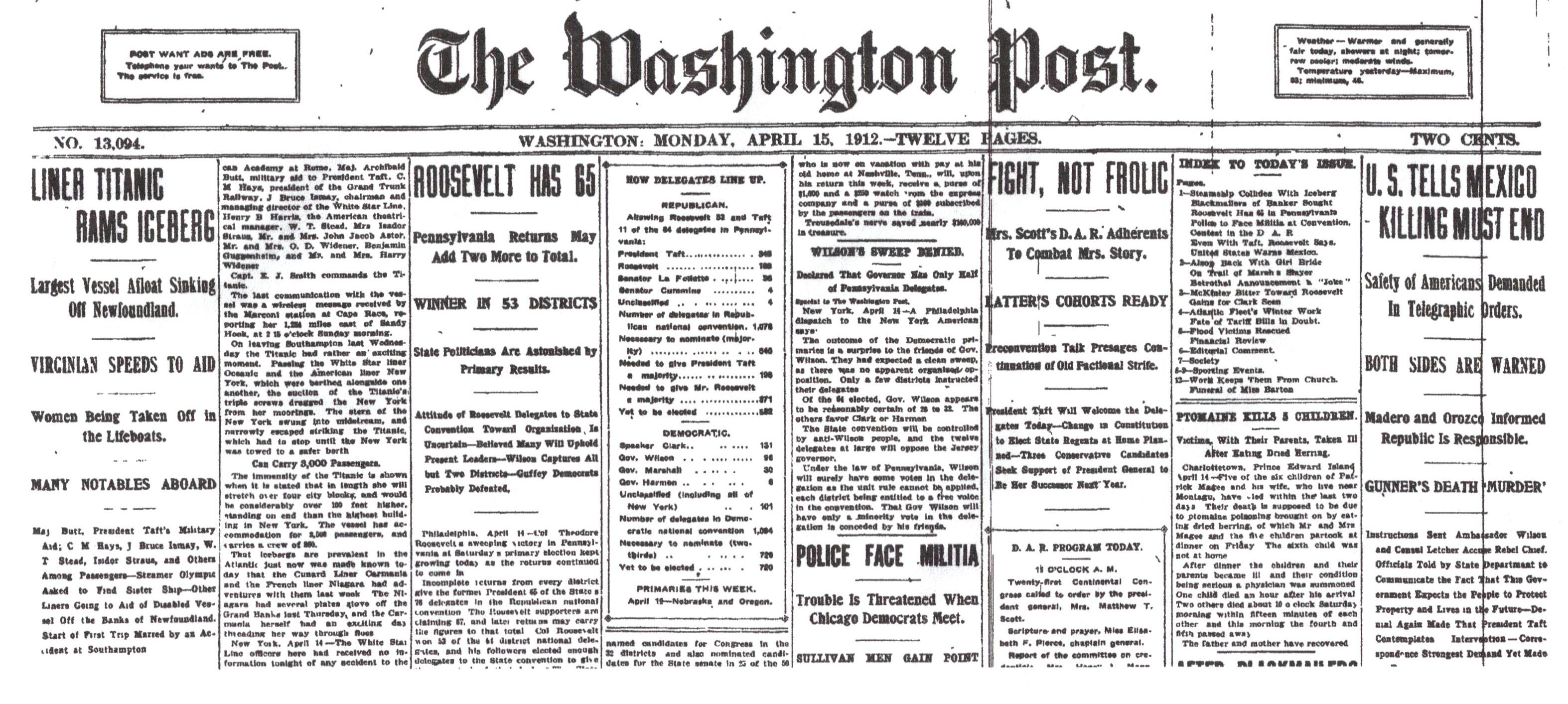
On April 14, 1912, the Titanic hit an iceberg and sank, killing 1,517 passengers. As word spread around the globe, newspapers rushed to keep up with developing events. Almost daily, the Washington Post published “extras” to meet the demand for information such as the names and the fate of the passengers. Newsboys worked into the night to take advantage of the opportunity to make some extra change. Among them were Samuel, David and Israel “Izzy” April.
This story is yet one more example of how the lives of child laborers and their families intersected with great historical events – how they were affected by those events, and how they helped to shape those events. Farther along in the story, we will see more evidence of that.
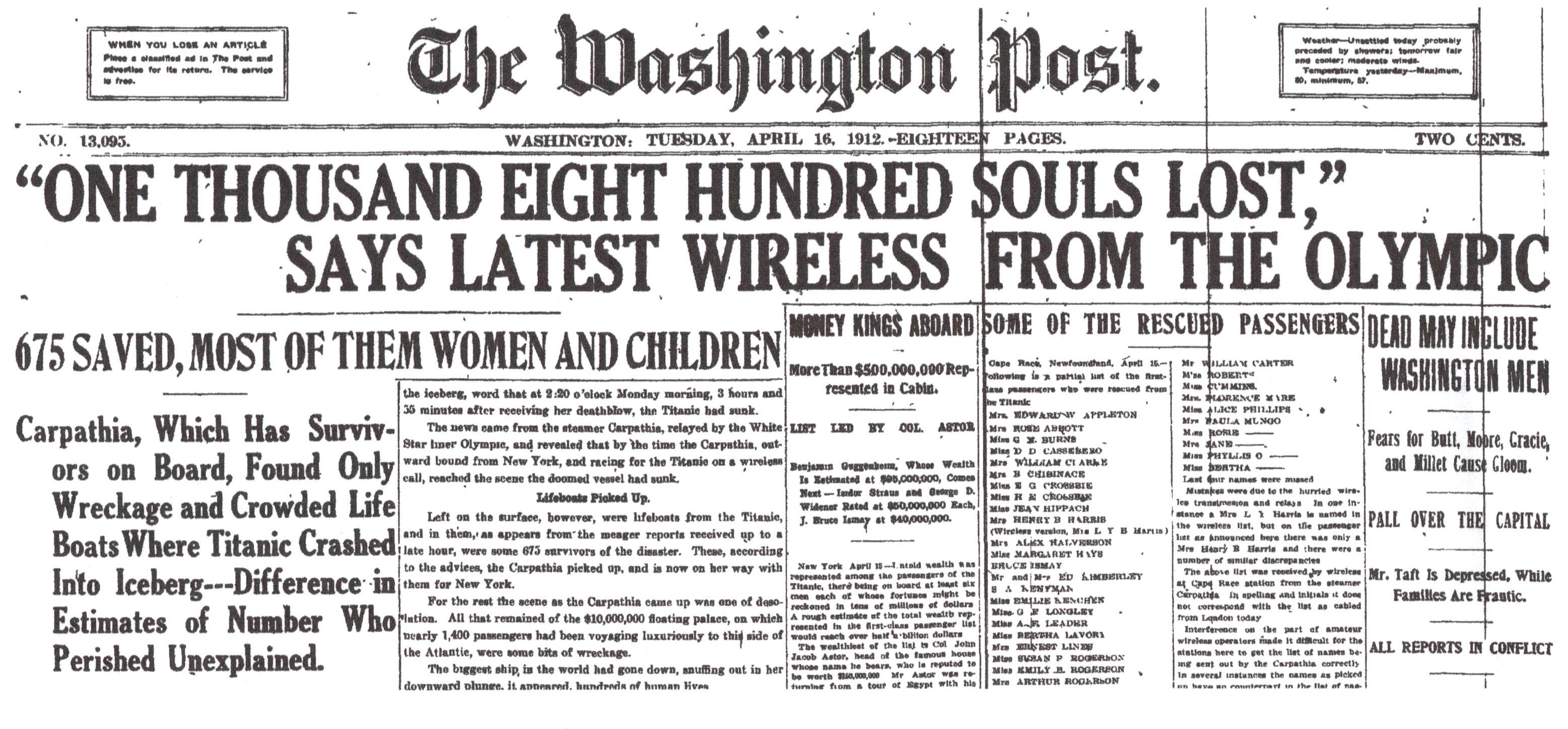
I enlarged the Hine photo at the top of this page and could see the headline on the April 17 edition. Since it was an extra edition, it does not appear in the Washington Post searchable archives. But the daily editions do, and they give us a sense of what was happening from day to day.
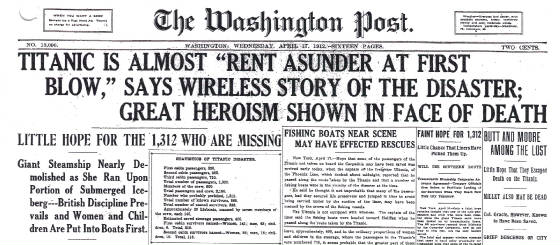
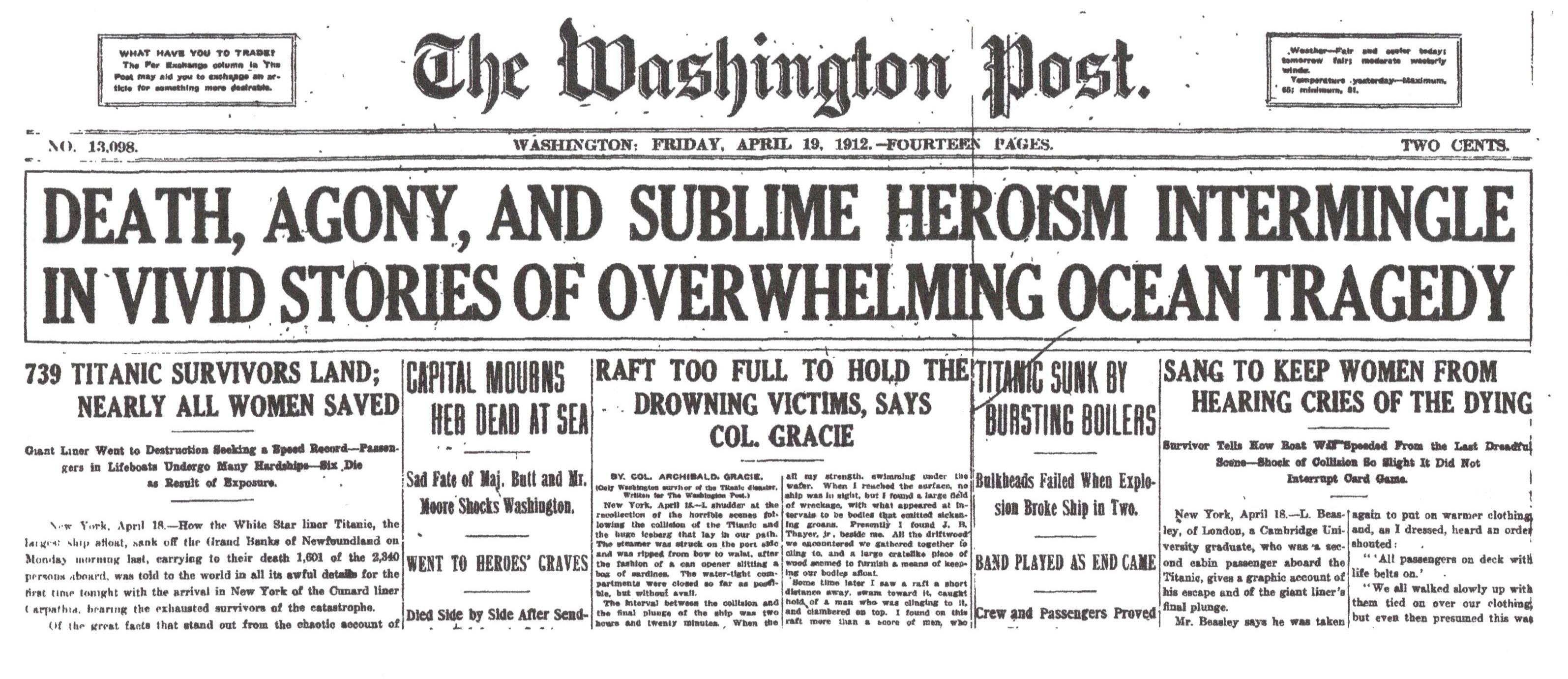
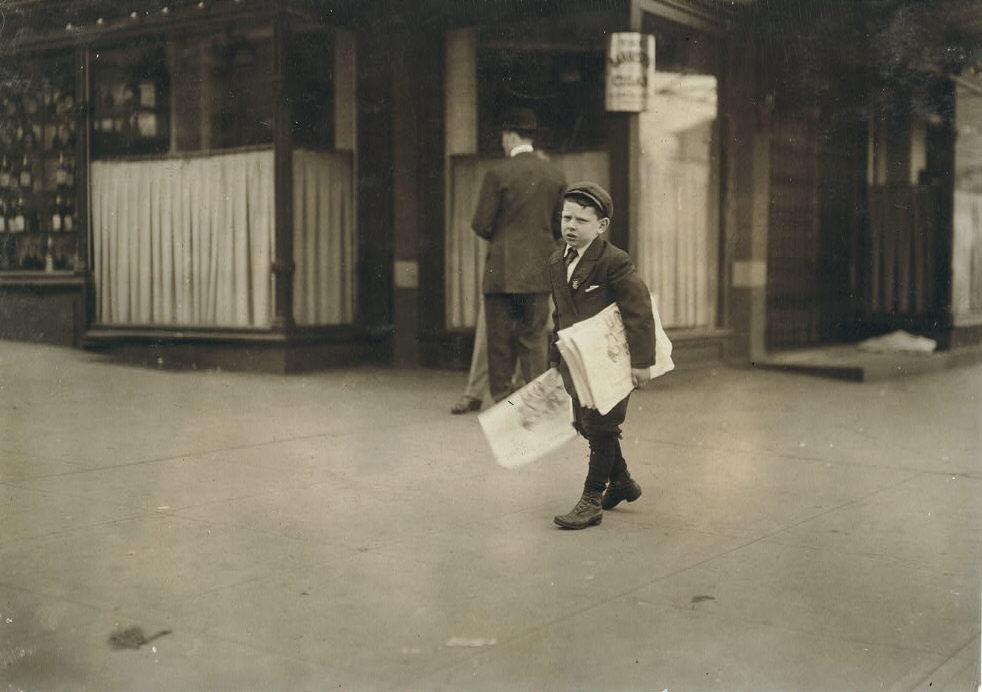
Lewis Hine caption:Israel April, 314 I St., S.W., Washington, D.C. “I serves the President”. 9 yr. old newsboy with no badge selling near Willard Hotel, Sunday P.M.,4/14/12. Been selling for several years. I found him selling after midnight April 17th and 18th. Quite a pugnacious little chap. He and his brother are said to have a large clientele among ambassadors and senators. Location: Washington (D.C.), District of Columbia.
In 1916, four and a half years after the boys were photographed, their mother, Mollie, died at the age of 46. Their father would remarry in several years, to Dora, who had come to the US from Russia in 1898. In the 1920 census, the family was listed as living at 1123 Fifth St, in Northwest Washington. Mitchell was a wholesale vinegar dealer.
In the 1930 census, Mitchell and Dora are living in Alexandria, Virginia, where he runs a grocery store. David, still in Washington, works in a drugstore and is married to Helen. They have two children. Samuel, a furniture salesman, also lives in Washington. He and wife Rebecca have two children. Somehow, Israel didn’t get counted in the 1930 census.
By searching the Washington Post archives, I was able to locate an obituary for Israel April, and that led me to his descendants, including his daughter, Patricia Coshland, whom I interviewed.
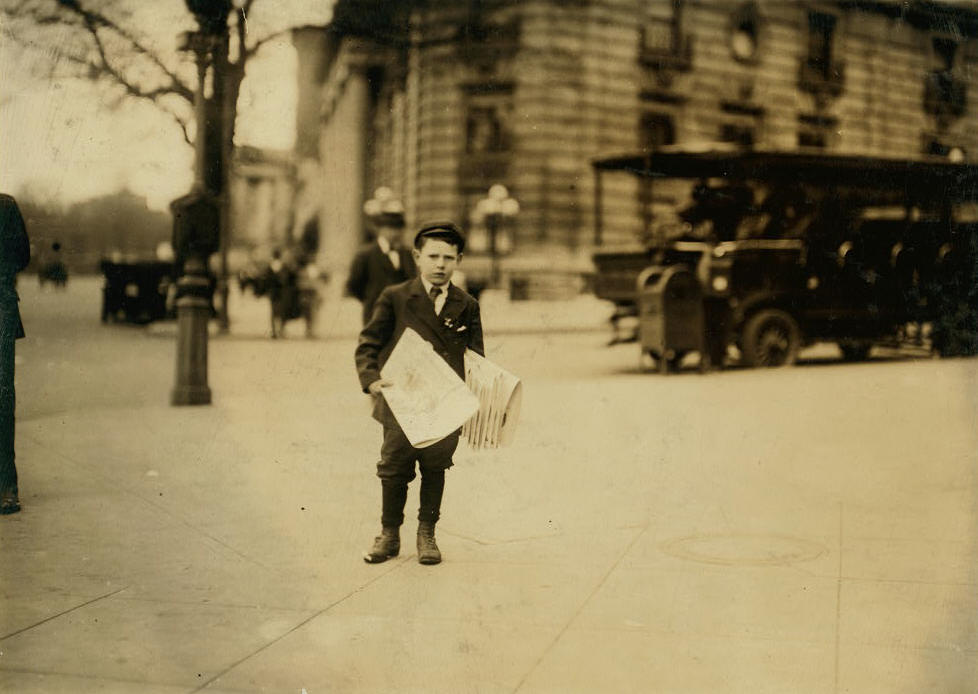
Lewis Hine caption: Israel April, 314 I St., S.W., Washington, D.C. “I serves the President”. 9 yr. old news boy with no badge selling near Willard Hotel, Sunday P.M., 4/14/12. Been selling for several years. I found him selling after midnight April 17th and 18th. Quite a pugnacious little chap. He and his brother are said to have a large clientele among ambassadors and senators. Location: Washington (D.C.), District of Columbia.
Edited interview with Patricia Coshland (PC), daughter of Israel April. Interview conducted by Joe Manning (JM) on September 6, 2008.
JM: You told me you had seen the photos before.
PC: Yes, I had some of them. I think I got them from my mother. I don’t know where she got them from. Later on, one of the photos was in the Washington Post Sunday Magazine, and I knew right away that it was my father and his brothers.
JM: When you first saw the photos, did you realize that they had some historical importance?
PC: Yes, because my father was selling newspapers when the Titanic sank. My brother Marty told me that my father or one of his brothers delivered newspapers to the White House.
JM: What was your reaction to seeing your father and his brothers selling newspapers at that age on the streets at night?
PC: They did anything they could to make money. It was a very poor family, with lots of children. Their parents were from Russia. My father lost his mother at a young age. My grandfather remarried, and I don’t think the boys liked her, so they apparently moved in with their older sisters, who raised them at that point.
JM: How old was your father when his mother died?
PC: I’m not sure, maybe about 10. (He was 13.)
JM: What did his father do for a living?
PC: He owned a grocery store in Arlington, right across the river.
JM: In the 1920 census, his father is living with wife Nora.
PC: My father’s mother was named Mollie. Nora must have been the second wife.
JM: Who were the other boys in the picture?
PC: Sam and Dave. Sam had an auto paint shop on Church Street, in DC. His children ran that till recently, when they sold it. Dave lived out in Maryland on a piece of property right near College Park. When University Boulevard was put in, they took over the land and he made quite a bit of money. He was in the liquor business. It’s interesting about Ellis, who was a much younger brother. I don’t know whether his brothers and sisters paid for his schooling, but he became a doctor. He was an allergist in DC.
JM: Did your father go to college?
PC: Yes. My brother recently gave me a newspaper picture of my father and three other young men, who are shown receiving scholarships to college. My father is wearing a football uniform. He got a scholarship to Penn State. I had it framed.
JM: Did your father graduate from Penn State?
PC: No. He ended up at Grove City College near Penn State, and played football for them. He graduated from George Washington University. (According to her brother Marty, freshmen couldn’t play football, so Penn State sent him to Grove City College. He went back to Penn State for his second year. He was also on the wrestling team, but he broke his collar bone, so they took away his scholarship. Apparently, his older brothers helped him pay for the rest of college.)
JM: What did he do when he graduated from college?
PC: Various and sundry things. He sold cars in the 1930s. At that time, he had to go to Detroit to get the cars, bring them back, and then he had to teach the customers how to drive them. When I was growing up, he was a liquor salesman. In DC, there were a lot of distributorships. We have a lot of beer and liquor memorabilia.
JM: Where were your parents living when you were born?
PC: I was born in 1944, in northwest Washington. We owned a house on Roxanna Road, right off 16th Street, below Silver Spring on the DC/Maryland border. We used to say that the President of the United States lived at one end of 16th Street, and we lived at the other end. I lived there my whole childhood.
JM: What was your mother’s name?
PC: Myrtle Robin. She was originally from Philadelphia. She stayed at home when I was young, but after I finished junior high school, she went back to work for the government, for the Department of the Army.
JM: Did you go to college?
PC: I went to the University of Maryland, and I graduated in 1965. I graduated from high school in 1961.
JM: What was your father like?
PC: He was very outgoing. Everybody liked him. He always had a smile on his face. My son is just like him. And he is a salesman, just like him. My brother Marty was also a salesman. My father loved sports. He thought I was a third son, so he took me to a lot of baseball games at old Griffith Stadium. He had a big family, and they were very important to him. We used to go back to New Jersey where he was born, and there were still a lot of the Aprils up there. He was born in a very small town called Carmel. They had orchards up there, and grew cranberries along with other crops.
JM: Why did they move to Washington?
PC: I am not sure.
JM: Would you describe your parents as being middle class?
PC: I guess so — probably lower middle class. I knew we didn’t have a lot of money, but I never wanted for anything. Two blocks away from me were big houses. The people from that neighborhood had really nice luxury cars. We didn’t have that. I always worked in the summertime when I was in high school. When I was in college, my parents paid for the first semester, and I paid for the second.
JM: Did your father talk about working as a newsboy?
PC: No. When you’re young, you don’t think to ask your parents about their lives. It’s only when they’re gone that you realize that you should have done that. When my mother passed away, my brother and I went through a bunch of pictures, but we don’t know who the people are. They didn’t write anything on the back of the pictures, and unfortunately, there’s no one left to identify them.
JM: Was your father in good health up until he died?
PC: Yes. He had never been in a hospital. He died of pancreatic cancer at the age of 67.
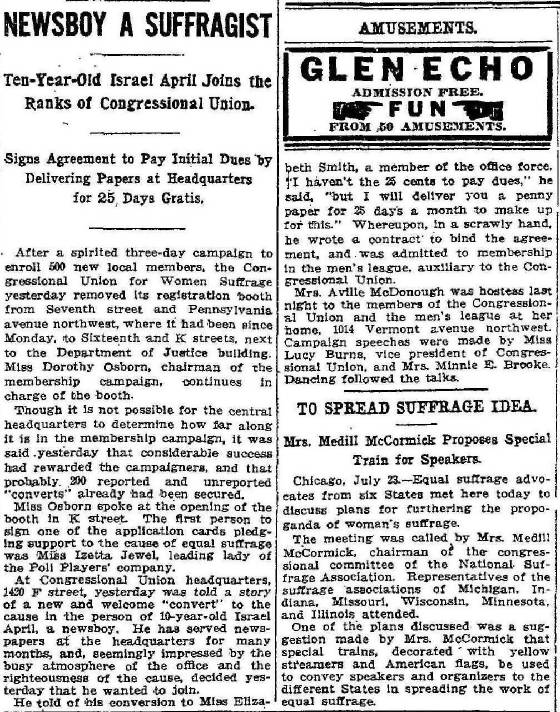
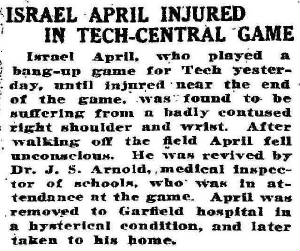
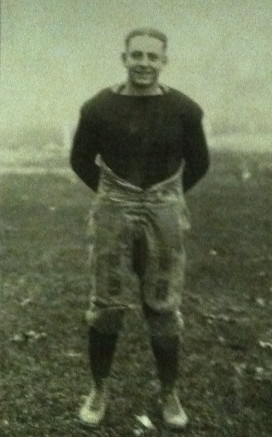
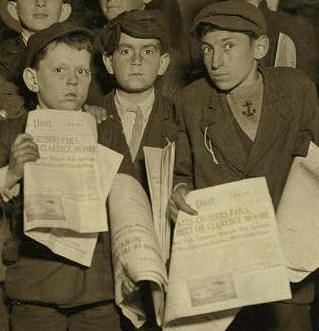
“My son and his wife have twins. When my son told me that they were going to name one of the twins Isabel and call her Izzy, I reminded him that my dad went by Izzy, and he said he knew that. Having a granddaughter carrying on a family name is very special to me.” -Patricia Coshland, daughter of Izzy April
Excerpts from obituaries of Israel, and his two brothers who appeared with him in the top photo.
July 6, 1970: Israel April, a retired wholesale liquor salesman, died yesterday after a long illness. Mr. April, 67, had been in the hospital for six weeks. Born in Carmel, NJ, he had been a Washington resident since 1908. Mr. April graduated from McKinley Technical High School, where he was an all-city football player, and from George Washington University. He also attended Pennsylvania State University. He was in the liquor business for more than 35 years. Mr. April was a leading donor to the American Red Cross blood bank, having contributed more than 100 pints of blood. He was a member of the Tifereth Israel Congregation.
July 7, 1984: Sam April, 83, owner and operator of an auto painting company in Washington for 40 years, died July 5 of cardiac arrest. Mr. April was born in Carmel, NJ, and moved to Washington when he was 7 years old. He graduated from the old Business High School and while in school delivered newspapers to the White House during the administrations of William Howard Taft and Woodrow Wilson. He opened his auto painting business, Rainbow Auto Painting, in 1929 and remained active in its management until he retired in the late 1960s.
November 20, 1980: David April, 82, a retired wholesale liquor salesman and lifelong resident who was active in the Masons and the American Legion, died of cancer Monday at his home in College Park. Mr. April was a salesman with Milton S. Kronheim & Company for 28 years before retiring in 1964. He was a Washington Post news carrier from the age of 10 to 16. His route included the White House, its residents during those years being William Howard Taft and Woodrow Wilson. Mr. April served in the Army during World War I.
*Story published in 2010.